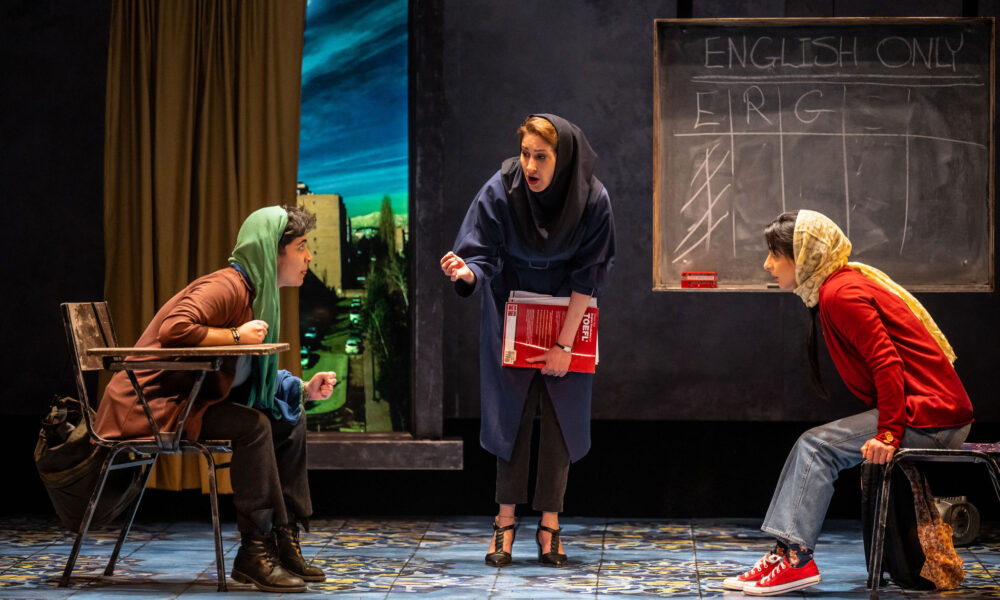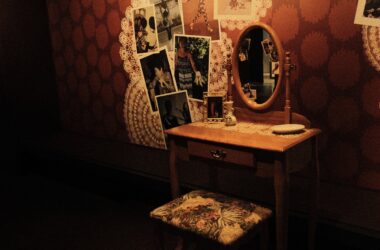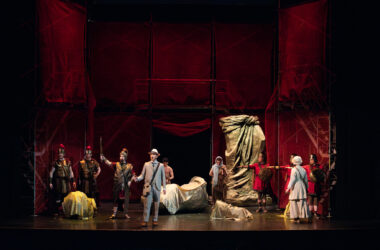“HELLO. WHAT IS YOUR FAVOURITE COLOUR?”
The militant aggression of Elham’s (Ghazal Azarbad) tone sends laughter rippling through the audience. She wants to go to Australia for medical research with a renowned professor studying gastrointestinal diseases. She has a fantastic MCAT score. She wants to help people.
She’s failed the Test of English as a Foreign Language (TOEFL) multiple times.
Elham is one of four students in an English class in 2009 in Karaj, Iran. They all want to learn English for different reasons but stand together under the dark cloud of English linguistic hegemony.
English, written by Sanaz Toossi and co-directed by Anahita Dehbonehie and Guillermo Verdecchia, explores language, identity, family, and otherness through the ensuing classroom shenanigans. The play ran at the Segal Centre this past month.
Ghazal Partou gives a compelling performance as the encouraging yet austere teacher Marjan, who had previously lived in London for almost a decade. There, she went by Mary. She encourages her students to speak in ENGLISH ONLY, sparking a combination of malapropisms, frustrations, and major questions about what language really means.
We see people learning a new language at different stages of their lives, for a variety of reasons. The winsome, overall-clad Goli (Aylin Oyan Salahshoor) is 18. She believes the world will open up to her once she learns English. Roya (Banafsheh Taherian) wants to live with her son’s family in Canada, but her son wants his daughter fully immersed in English and doesn’t want Roya to confuse her by speaking Farsi. And then there’s the enigmatic Omid (Sepehr Reybod), who comes into the class speaking English suspiciously well.
The production was intentional in casting all Middle Eastern and North African (MENA) actors. An especially important choice as the Asian American Performers Action Coalition found in their 2018-2019 Visibility Report that across the board, only 1.3 per cent of hired actors and 1.5 hired writers claim MENA descent, despite accounting for 3 per cent of the American population.
English takes a creative approach to storytelling in both English and Farsi to a primarily anglophone audience. When the characters speak English, the actors speak with a Farsi accent. When the characters speak Farsi, the actors speak with American-English accents, vocally flipping the script.
A key tension within the play is whether or not learning a new language means becoming a new person. The audience is left to ponder how much we lose in translation, and how much good in the world is sacrificed in the name of assimilation. If learning a new language means assuming a new identity, does that mean Roya’s granddaughter will never really know her?
Though the debates around language are political, the creative team doesn’t overtly centre English around politics. The play’s lighthearted humour is crucial to its message. Notably, the audience and characters rarely laugh together.
For instance, when Omid encourages the timid Goli to ignore the reactions of those around her, to “screw everyone, fuck everyone!”, Goli replies by enthusiastically proclaiming, “OKAY, I WILL FUCK EVERYONE!”
The funniest lines were those that resulted from miscommunications. When the laughter ceases, the atmosphere in the theatre transforms completely, and the audience is left to ponder what exactly they were laughing at.
The purpose of language is often considered to be functionality, but communication and connection go far beyond grammar and vocabulary. Humour is often overlooked in language politics, but it is a key feature that links us together as humans. Perhaps Marjan captures this complexity best when she tells Omid, “[y]ou go years without making anyone laugh.” The audience fell silent.
Montreal provides a unique setting for a play about language, especially one entitled English. When you walk out of the theatre, the play doesn’t really end—its messages are reflected in Quebec’s language divide, protests against Bill 96 and Bill 21, and the Woman Life Freedom movement following the death of Jina (Mahsa) Amini. The set design also features a window looking out onto Karaj, visually linking the classroom to the outside world.
Both inside and outside the theatre, the audience is left to question the purpose of language: Ultimately, should it assimilate or communicate?
English ran from March 19 to April 2 at the Segal Centre.









